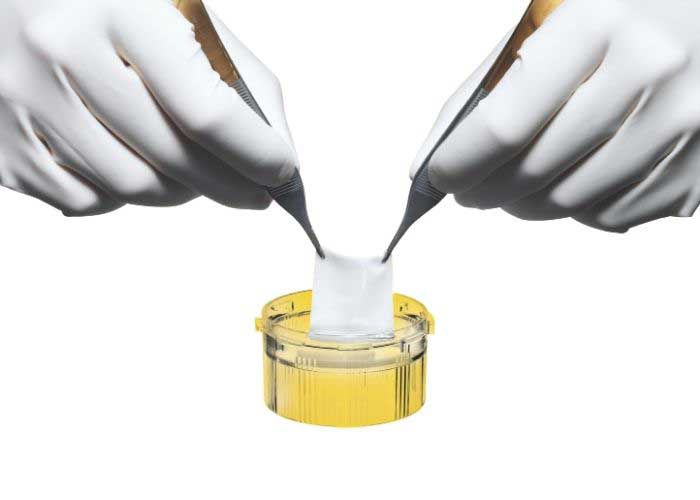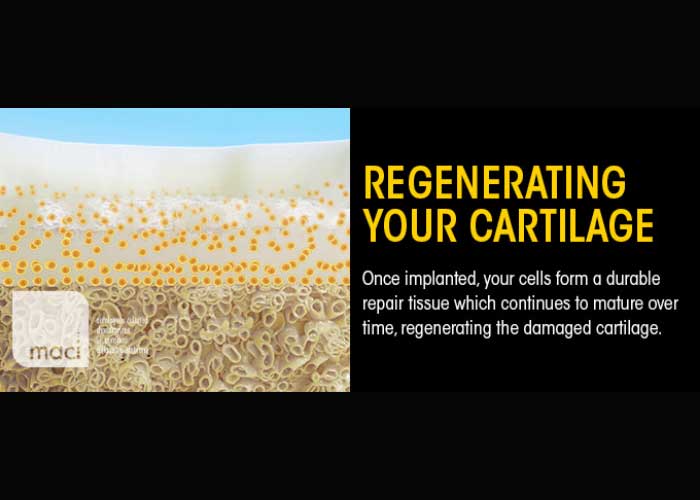Articular Cartilage Repair Specialist

Do you have knee pain, stiffness or swelling in the joint? If so, you may have articular cartilage damage in the knee. Articular cartilage damage can lead to arthritis and if left untreated, the need for a total knee replacement. Now there is a new FDA-approved biologic procedure called matrix-induced autologous chondrocyte implantation, or MACI. MACI is a surgical procedure that uses a patient’s own cells to regrow new articular cartilage in the knee. MACI specialist, Doctor James Mazzara offers this treatment to patients in Manchester, South Windsor, Enfield, Glastonbury and surrounding Hartford communities who are looking for an alternative to a total knee replacement. Contact Dr. Mazzara’s team today!
What is MACI?
Matrix-induced autologous chondrocyte implantation or MACI is a surgical procedure that uses a patient’s own cells to regrow new articular cartilage in the knee. The first FDA-approved product of its kind, MACI applies the process of tissue engineering to grow cells on scaffolds using healthy cartilage tissue from the patient’s own knee. MACI is a 2-step process*:
- Step One: A small piece of healthy cartilage (about the size of a tic-tac) is obtained from the patient arthroscopically. The cartilage biopsy is sent to a lab and is grown on a sterile collagen membrane (matrix) for 2 to 4 weeks.
- Step Two: Dr. Mazzara takes the new cartilage material and shapes it to perfectly fit the articular cartilage defect in the knee. The lab-grown chondrocyte cells that have been seeded onto the collagen membrane are implanted into damaged area in the knee. This stimulates the regeneration of the cartilage, bringing back the flexibility and eliminating pain.
*The timing of the procedure(s) may vary from 4 to 8 weeks, depending on insurance approval and scheduling constraints.

Image courtesy of MACI
What is articular cartilage in the knee?
Articular cartilage in the knee is the shiny, slick substance that covers the ends of the bones in the knee. Often compared to the cartilage at the end of a chicken bone, the articular cartilage allows the bones to glide against each other smoothly and without pain. If the articular cartilage becomes damaged or worn away, it cannot repair itself. Articular cartilage can be damaged from wear and tear or from an injury, resulting in bone-on-bone movement and arthritis. MACI is used to repair and regenerate the damaged articular cartilage in the knee, restoring it naturally, using the body’s own cells. Dr. James Mazzara, orthopedic biologics specialist, offers MACI to qualifying patients in Manchester, South Windsor, Enfield, Glastonbury and surrounding Hartford communities.
Who are the best candidates for MACI?
MACI, or matrix-induced autologous chondrocyte implantation is a great alternative to a total knee replacement or arthroplasty. However, MACI is not right for every patient and only select patients will benefit from the implantation. Patients who are the best candidates for MACI include:
- Patients who have symptomatic articular cartilage damage in the knee.
- Patients experiencing patellar instability with accompanying cartilage damage in their patellofemoral joint.
- Patients who have cartilage damage in the tibiofemoral region of the knee.
- Patients between the ages of 18 and 55
- Patients who have not had knee surgery in the last 6 months.
- Patients who are willing and able to complete a very specific rehabilitation program following surgery.
How long is the recovery following MACI surgery?
MACI is a two-step procedure, requiring two recoveries following each step.
- Step 1 – The biopsy is done arthroscopically, which is a minimally invasive procedure, allowing the patient to return home the same day. Weight bearing activity is as tolerated and most patients return to work within a few days.
- Step 2 – The placement of the matrix-induced autologous chondrocyte implant is done as an out-patient procedure and patients usually go home the same day.
- Patients are placed in a knee brace, which will be worn for 6 weeks.
- Weight bearing is as tolerated with full weight bearing expected by 7-8 weeks.
- A CPM (continuous passive motion) device will be used in the first weeks after surgery to maintain range of motion, prevent scar tissue and encourage cartilage growth.
- Physical therapy begins between 4 and 6 weeks and will need to be followed exactly as prescribed.
- Return to work occurs between 2-6 weeks.
- Depending on the tissue growth and rehabilitation, patients often return to high impact activities 9 months to 1-year after implantation.

Image courtesy of MACI
Will my insurance pay for MACI?
MACI is the first FDA approved procedure of its kind and most insurances are now covering MACI. However, every insurance policy is different, and each patient’s specific cartilage damage and personal history are unique. It is best to talk with your insurance if you are a candidate for MACI and pre-approval is required. MACI offers case-management to assist patients in the approval process and they can work with your insurance and Dr. Mazzara’s team to get approval.
Does MACI work?
Patients who are good candidates for matrix-induced autologous chondrocyte implants have experienced significant improvement in knee pain and function. The articular cartilage grows back in the damaged area and patients are often able to return to work and sporting activities.
For more information on MACI or matrix-induced autologous chondrocyte implantation, or to find out if you are a candidate for this specialized and effective articular cartilage repair procedure, please contact the office of James Mazzara, MD, orthopedic biologics specialist, serving Manchester, South Windsor, Enfield, Glastonbury and surrounding Hartford communities.